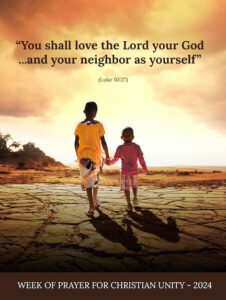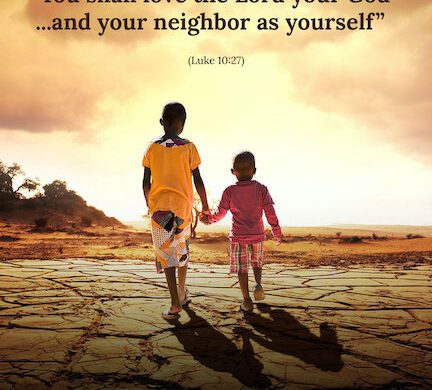
SCRANTON – Faithful throughout the Diocese of Scranton will join with members of various Christian congregations of northeastern Pennsylvania for an Ecumenical Celebration of the Word of God on Wednesday, Jan. 24, 2024, at 12:10 p.m. in the Cathedral of Saint Peter.
The event highlights the annual Week of Prayer for Christian Unity which has been celebrated each January since its inception in 1908.
The theme for the 2024 celebration is: “ You shall love the Lord your God … and your neighbor as yourself” (Luke 10:27).
The Most Rev. Joseph C. Bambera, Bishop of Scranton, will serve as leader of prayer for the traditional ecumenical prayer service. Bishop Bambera is once again serving as Chairman of the U.S. Bishops’ Committee on Ecumenical and Interreligious Affairs.
Guest homilist for this year’s prayer service is Reverend Rebecca A. Barnes, Rector of Saint Luke Episcopal Church, Scranton, and President of the Scranton Multifaith Ministerium.
Students from Holy Rosary School in Duryea will provide the music for the religious gathering, under the direction of David Tighe.
The Ecumenical prayer service will be broadcast live at 12:10 p.m. on CTV: Catholic Television of the Diocese of Scranton. It will also be made available on the Scranton Diocese website and across all diocesan social media platforms.
As the universal Catholic Church, including local dioceses, immerses itself deeply into the call for a new evangelization proclaimed by Pope Francis through the 2023 Synod on Synodality, both ecumenism and interreligious dialogue have been given prominence in the discussion.
In the Vademecum for the Synod on Synodality, the Official Handbook for Listening and Discernment in Local Churches, it is stated: “The dialogue between Christians of different confessions, united by one baptism, has a special place in the synodal journey.”
According to Monsignor Vincent Grimalia, Diocesan Coordinator for Ecumenical and Interreligious Affairs, the Week of Prayer for Christian Unity provides not only an opportunity for prayer for Christianity, but a time to learn more about various Christian churches and communities while offering motivation and commitment for year-long participation in ecumenical activities.
“It is an opportunity to renew and re-energize our commitment to Christian unity,” Monsignor Grimalia said. “In a world with so much disunity, there is a need to overcome divisions and polarization and work to get nations and various ethnic, cultural and language groups to work together.”
Saint John Paul II, in his encyclical Ut Unum Sint, quotes from the Second Vatican council.
He wrote, “This statement of the Decree Unitatis Redintegratio is to be read in the context of the complete teaching of the Second Vatican Council. The Council expresses the Church’s decision to take up the ecumenical task of working for Christian unity and to propose it with conviction and vigour: “This sacred Synod exhorts all the Catholic faithful to recognize the signs of the times and to participate actively in the work of ecumenism.”
Saint John Paul reflects on the necessity of prayer and dialogue among elements of ecumenism and reminds everyone of its importance because Jesus prayed for unity of his followers.
He continued, “All this is extremely important and of fundamental significance for ecumenical activity. Thus it is absolutely clear that ecumenism, the movement promoting Christian unity, is not just some sort of ‘appendix’ which is added to the Church’s traditional activity. Rather, ecumenism is an organic part of her life and work, and consequently must pervade all that she is and does; it must be like the fruit borne by a healthy and flourishing tree which grows to its full stature.”
